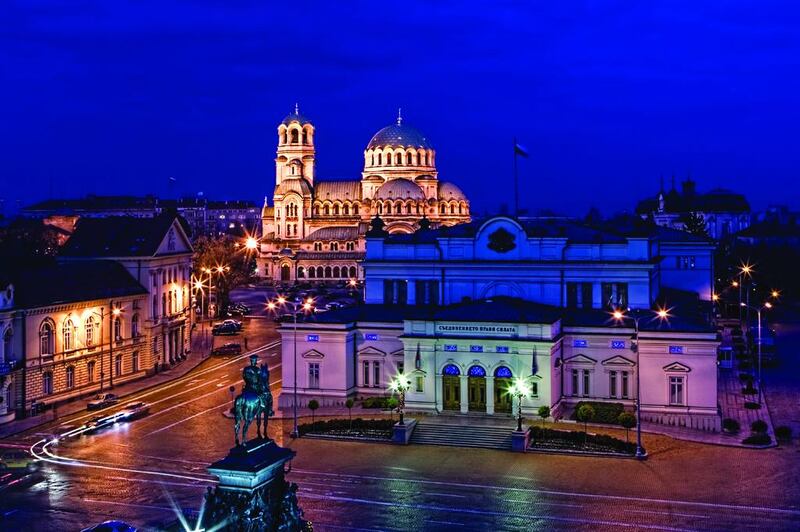Why Sofia?
Long ruled by the Ottomans, Sofia became the capital of a newly independent Bulgaria in 1878, and these days its ornate churches and mosques are interspersed with modern cafes, restaurants and picturesque parks.
Once an ancient Thracian settlement, remains of the 1,800-year-old Roman city Serdica lie beneath the paving stones of modern Sofia, with various sections of roads and city gates – found during modern construction projects – left on display. Nearby, monumental government buildings attest to the decades of communist rule during the second half of the 20th century, completing the historical journey of the city.
The heart of one of the European Union’s newest nations, Sofia combines history with youthful energy and the cheapest prices in a European capital (according to recent polls), all within an easily walkable city centre.
A comfortable bed
For guaranteed peace of mind, the five-star Radisson Blu (www.radissonblu.com; 00359 2933 4334), located opposite the National Parliament building at the heart of the city, has doubles starting from €115 (Dh570) per night, including tax and breakfast.
Billed as Sofia's first upscale design hotel, Sense Hotel (www.sensehotel.com; 00359 7002 0670), which opened last year, offers luxury and unrivalled views in a central location. Rooms start from €75 (Dh373) per night, including tax. Les Fleurs Hotel (www.lesfleurshotel.com; 00359 2810 0800), another highly rated boutique hotel, has rooms starting from €85 (Dh422) a night, including tax.
Alternatively, head to Arena di Serdica (www.arenadiserdica.com; 00359 2810 7777) where history literally blends with comfort, with a section of an ancient Roman amphitheatre located within the hotel's lobby. Rooms start from €110 (Dh446) a night, including tax and breakfast.
Find your feet
At its heart, Sofia is a compact and easily walkable city. Follow Tsar Osvoboditel Boulevard, with its unusual yellow brick road (a wedding gift to a late 19th-century Bulgarian prince), past the imposing Soviet-style governmental buildings, the National Art Gallery, and on to Parliament Square, with its impressive statue of Emperor Alexander II, who liberated Bulgaria from Ottoman rule. Make sure to take a small detour en route to check out the 4th-century Rotunda of St George, a small church hidden behind the Ministry of Education and Science. Finally, head up to the gold-domed St Alexander Nevsky Cathedral, a towering landmark finished in the early 20th century and now the seat of the Bulgarian Orthodox Church. You can also take one of the free, twice-daily guided city tours (www.freesofiatour.com).
Meet the locals
Every evening, the restaurants, cafes and bars on Vitosha Boulevard, a broad, pedestrianised street that runs through the centre of Sofia, fill with crowds of Bulgarians and foreign visitors. In the summer months especially, young and old gather on the traffic-free street, with restaurant terraces expanding outward and plenty of live-music performances.
Book a table
Bulgaria is renowned for its hearty and flavoursome cuisine, notably the skara (grilled meats). Check out Pod Lipite (www.podlipitebg.com), a popular dining option and one of the oldest restaurants in the city. Be sure to try the Gergeovski roast lamb (17.90 Bulgarian leva; Dh45), and the pan-fried wild mushrooms with fresh herbs (9.70 leva; Dh25).
With its lakeside location, Edno Vreme (www.ednovreme-ariana.com) offers Bulgarian hospitality, traditional cuisine and nightly shows featuring music, fire walking and folk dances. Try different types of meatballs (starting from 3.20 leva; Dh8) or some of the traditional salad dishes.
If you’re looking for a quick snack as you explore central Sofia, duck into Supa Star (8 Tsar Ivan Shishman Street) behind Parliament Square, which offers delicious and intriguing soup combinations. Try the chicken and lentil, carrot and coriander, or simply the traditional borscht (soups cost around 5 leva; Dh13).
Shopper’s paradise
Most high-end fashion brands are located on Vitosha Boulevard. For a more lively experience, visit the unpredictable Zhenski Pazar (Ladies’ Market) with its jumbled stores offering fresh fruit, vegetables, meat and cheese. It’s also well worth checking out the open-air and seemingly ad hoc antique market just across from St Alexander Nevsky Cathedral – an ideal place for picking up simple souvenirs, and Soviet-era memorabilia; you might even find a Roman coin or two.
What to avoid
Zhenski Pazar has a reputation for pickpockets, so be on guard there, although the rest of the city is safe. Also, depending on your timing you might arrive in Sofia during one of the many anti-government protests, which, while nearly always peaceful, can be a nuisance if you only have a short time there.
Don’t miss
A short taxi ride from central Sofia, on the outskirts of the city, the 10th-century church of Boyana (www.boyanachurch.org) is considered one of the best-preserved examples of medieval Balkan art in the region. The 13th-century frescoes, which almost completely cover the walls and ceilings of the small church, are well worth the visit alone, and were a key reason why Boyana was added to the Unesco World Heritage list in the 1970s.
Go there
Turkish Airlines (www.turkish-airlines.com) flies to Sofia from Abu Dhabi, via Istanbul, with round-trip fares starting from €428 (Dh2,143), including taxes.
[ weekend@thenational.ae ]
Follow us @TravelNational
Follow us on Facebook for discussions, entertainment, reviews, wellness and news.





